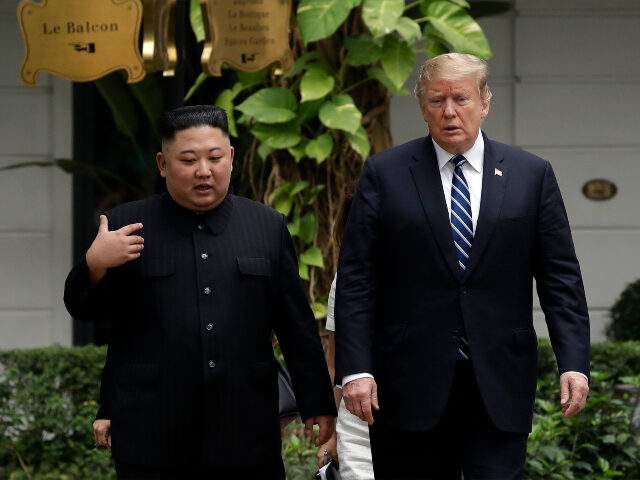North Korea’s Legal Media Outlets Silent on Trump Win over a Week Later
 Evan Vucci/AP
Evan Vucci/AP
North Korea’s state-run media outlets, the only legal form of media in the country, have not yet at press time reported that Donald Trump won the American presidential election on November 5, leaving the majority of the nation’s population in the dark.
Pyongyang typically does not immediately announce the winner of American presidential elections and has waited increasingly long times to name the new chief executive of the United States in recent elections. As of Thursday, neither the flagship Korean Central News Agency (KCNA), the state newspaper Rodong Sinmun, nor its vast network of smaller outlets have informed North Koreans that the former president won a second term in the White House.
North Korean state media instead emphasized the formal ratification of a mutual defense treaty between Pyongyang and Moscow, brokered during a visit to the North Korean capital by Russian strongman Vladimir Putin this summer.
Communist dictator Kim Jong-un has also avoided the public eye since the presidential election. Shortly before the vote, Kim appeared in a flurry of state propaganda, including images celebrating the testing of an allegedly new model of intercontinental ballistic missile (ICBM), the Hwasong-19. Both South Korea and Japan warned shortly after the election that North Korea appeared to have conducted preparations for a seventh nuclear weapons test, but that test never occurred before the election.
South Korea’s Korea JoongAng Daily suggested, citing “analysts,” that Pyongyang was keeping its silence as a “strategic move rather than indifference.” The South Korean government, the newspaper noted, responded to the reports of North Korea ignoring the American election results by stating that it would not “prejudge” the situation, “as North Korea has a history of delaying reporting on U.S. election results.”
The South Korean news agency Yonhap similarly reported on Wednesday that Pyongyang’s propaganda arms had not mentioned the election at all. Yonhap indicated that the silence was not necessarily a departure from precedent, as state media reported Trump’s first victory in 2016 ten days after the election. Outgoing President Joe Biden’s win in November 2020 made headlines in North Korea in late January, after Inauguration Day.
Biden had received far more acrimonious treatment in North Korean state media than Trump prior to his victory. During the 2020 presidential campaign, KCNA published a commentary article referring to Biden as a “rabid dog” and suggesting that Americans have him “beaten to death with a stick.”
Like JoongAng, Yonhap speculated that the reason for the silence may be North Korea waiting for signs of what sort of policy Trump would adopt regarding the rogue communist regime.
“Since Trump’s new foreign policy team has not yet formally taken office, North Korea is likely to wait until his policy on North Korea takes shape in his second term and until he makes an initial statement about North Korea before issuing its own response,” the agency reported.
Biden ultimately failed to adopt a coherent policy regarding the Korean peninsula, prioritizing European issues over concerns in Asia. Biden’s apparent disregard of North Korea’s growing belligerence against the South during his tenure prompted the president of South Korea, Yoon Suk-yeol, to openly speculate that his country could “possess its own nukes,” to which Biden responded by sending an American nuclear-capable submarine to the port city of Busan in 2023.
Biden also sent Vice President Kamala Harris, Trump’s election rival, to the Korean Demilitarized Zone (DMZ) in 2022, where she proceeded to declare that “the United States shares a very important relationship, which is an alliance with the Republic of North Korea.”
Trump, in contrast, made preventing another North Korean nuclear test and cooling tensions on the Korean peninsula a top priority. Trump invested in building a relationship with Kim, meeting him in person on three occasions but walking out during their last meeting in 2019, calling Kim’s demands unreasonable.
“Sometimes you have to walk and this was just one of those times,” Trump said of his decision. “It was about the sanctions … basically, they wanted the sanctions lifted in their entirety, and we couldn’t do that.”
Despite Kim’s failure to conduct their final meeting in such a way that it could concluded when scheduled, Kim hinted to some positive opinion of Trump remaining as recently as this summer, when he sent a message of sympathy to Trump after surviving an assassination attempt in Pennsylvania.
“He sincerely hoped that they would be recovered as soon as possible. He hoped they will surely overcome it,” KCNA reported that Kim told Trump in a message to him and his family. Pyongyang later clarified that any “personal feelings” Kim had about Trump would not have any positive effect on the North Korean-American relationship.
Trump made one of his first phone calls after winning reelection to Yoon, the South Korean president, who told reporters that he used his time to warn of growing North Korean belligerence.
“When I told him that they [North Korea] have sent 7,000 waste balloons across the border, jammed our GPS systems, and recklessly launched ICBMs [intercontinental ballistic missiles] and IRBMs [intermediate-range ballistic missiles], he [Trump] said it was ‘unbelievable,’” Yoon told reporters. “We agreed to meet soon to share lots of information and discuss countermeasures.”
Follow Frances Martel on Facebook and Twitter.
Source link

